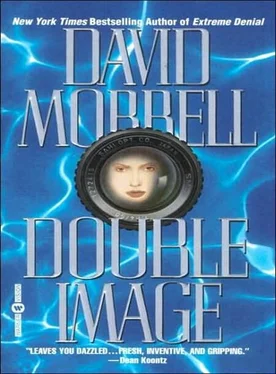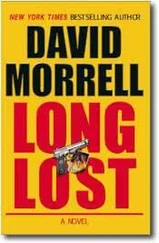“Yes.”
“Our own private show.”
Coltrane turned her toward him and brought his mouth to hers. As the cliff seemed to waver, he had a fleeting sense that it wasn’t their bodies but their souls that were trying to merge. Maybe that’s why this is called a “soul kiss,” he thought. Then he was incapable of thought as they held each other tighter, kissing deeper.
THEIR HOTEL WAS ONLY A TEN-MINUTE STROLL AWAY, but Coltrane had no recollection of the restaurants and shops they passed, hurrying back, seeming to get there instantaneously, and yet he couldn’t recall an occasion when a comparable amount of time had seemed to take so long.
They barely managed to lock the door to their room before they were all over each other, unable to get enough of each other. Their hands slid urgently under each other’s clothes, their need so great that taking the time to undress would have been an unbearable postponement. Then it wasn’t necessary to take the time to undress, for they were suddenly naked, their clothes scattered everywhere as they pressed against each other, chest-to-chest, stomach-to-stomach, groin-to-groin, their skin itself a powerful sexual organ that drove them to even greater urgency. His back pressed against the switch on the wall, activating the overhead light. They didn’t care. The light didn’t matter. They were too absorbed by each other to turn it off. When they sank to the bed, Coltrane felt he was falling, never to stop. He rolled and twisted, sliding sweat-slicked over her, into her, moaning, seeming to soar above himself as he thrust, to plunge into himself as he withdrew. His brain pattern flashed white, black, white, black. Then there was only white, and he lay disoriented beside her.
Gradually, his heart pumped slower, no longer threatening to burst. When he finally mustered strength, he glanced toward Tash, whose eyes were closed contentedly, her body glistening with sweat.
“Don’t move.”
“I wasn’t planning to,” she murmured.
“I want to take your photograph.”
She didn’t answer for what seemed a long while. “Yes.”
When he stood and peered down, trying to decide what angle to use, he was so enthralled by the casual perfection of her unselfconscious nakedness that he almost forgot to reach for his camera. She was on her back, her arms spread with sensual exhaustion, her breasts at ease, gravity tucking her stomach in, her pubic hair a perfect triangle, her right leg straight, the left bent lazily.
He had never been with a woman who had so entranced him by the sheer fact of her being a woman. It was as if he felt attracted to her because of a subtle chemical signal that he was biologically programmed to find irresistible. But that didn’t explain it, even though the after-sex musk smell from her – it filled the room – made him feel intoxicated. His attraction was more than that. He had fallen in love with her long before he had met her. He had known her before and had been searching for her ever since.
He raised the camera, adjusted it, then lovingly sighted through the viewfinder, which heightened the impression she created. Her small, distant, yet close image became intensified, idealized. When he pressed the shutter button, he knew that this would be one of the finest photographs he had ever made. He took a dozen images from various angles, some of which were full shots, others half shots, a few of which showed only Tash’s breasts, one of which showed only her perfect dark triangle.
He knelt, easing his right hand onto her mound, luxuriating in its softness.
Tash placed her left hand over his. “That feels nice.”
Coltrane heard the forceful pounding of his heart.
“Do you think the photographs will be good?” Tash asked.
“Yes,” Coltrane managed to say.
“I’m surprised that I let you take them.”
“Thank you for letting me.”
“I trust you. I know you wouldn’t do anything with those photographs that would cheapen me.”
“… Never,” he said gently.
IN EYE-SQUINTING SUNLIGHT, the soldier, one of three at a roadblock between two Jeeps, held up his hand for Coltrane to stop. Coltrane was driving a five-year-old blue Ford station wagon with a crumpled fender and eighty thousand miles on it, the only vehicle that he had been able to find for rent. The car-rental agency had told him that the next day something better would be available, but Coltrane hadn’t wanted to wait. So, after making sure to get a good map and buy plenty of Mexican car insurance, they had headed south from Acapulco. Forty minutes beyond the airport, the rain forest-lined road had long since become two lanes, and the soldiers blocked their way.
Coltrane nodded in what he hoped looked like respect, asking in Spanish if anything was wrong.
Instead of responding, the soldier scowled into the station wagon’s backseat and rear compartment, both of which were empty except for an ice cooler on the back floor. The soldier lifted his right hand from his automatic weapon and motioned that he wanted the cooler opened. Tash bent over the backseat and complied, the two soldiers on her side of the car concentrating on her hips as she showed them that the cooler contained only soft drinks. With a dismissive gesture, the first soldier indicated that Coltrane could proceed.
“What was that about?” Tash asked.
“The man at the car-rental agency said the army’s been checking vehicles for guns and drugs.”
“They looked so sullen, God help anyone they decide to arrest.”
“This heat can’t have improved their humor.”
The temperature was almost ninety. The car’s air conditioning wasn’t working, forcing them to drive with the windows open. Away from the ocean breeze, the humidity seemed to have increased. But at least the air wasn’t hazed with automobile exhaust.
“If this map is accurate,” Tash said, “Espalda del Gato is the third village ahead of us – another thirty miles.”
“And if this road gets any worse,” Coltrane said as the station wagon jounced over a series of deep potholes, “it’ll take us all morning to get there.”
Tash handed him an ice-beaded can of Coke.
They got there in an hour. The first two villages were dilapidated, causing Coltrane and Tash to assume the worst when they rounded a foliage-rimmed curve and stopped to peer down at their destination. Surprised, they saw neat-looking thatch-roofed houses and shops in a small cove that had cliffs on the north and south and an inviting beach in the middle.
“It’s sort of a miniature Acapulco,” Tash said. “The way I suppose Acapulco once was.”
A few small boats were pulled up onto the beach. Other boats bobbed on waves beyond the cove’s entrance.
“Looks like a fishing village.”
“But not for long.” Coltrane pointed toward a yacht in the harbor. “It’s been discovered.”
When Coltrane got out to take photographs, something on the cliff opposite him made him focus his zoom lens in that direction. “Check this.”
He handed the camera to Tash, who peered through it toward a cluster of white structures on the cliff beyond the village. “Seems to be an estate.”
“Aim the camera farther to the right,” Coltrane said.
She did, then suddenly lowered it, turning toward him. “That rock formation up there.”
“A cat arching its back. The same as in Packard’s photograph. We found it.”
Excited, they got back in the car, but despite their eagerness to hurry into town, they were forced to drive slowly down a narrow switchback road. On the left, scarlet, pink, and white flowers thrived beneath a canopy of trees. On the right, a cliff dropped into the ocean. At last, the road leveled off, winding through rain forest. They passed a villager leading a burro laden with firewood. Several women carried baskets filled with bananas. The roadside activity increased. Rounding a bend, they came into the village, its picturesque buildings made of upright poles woven together, the palm-leaved roofs tied neatly, layered thickly. Locals glanced with curiosity toward the unfamiliar car and the two strangers inside it.
Читать дальше












